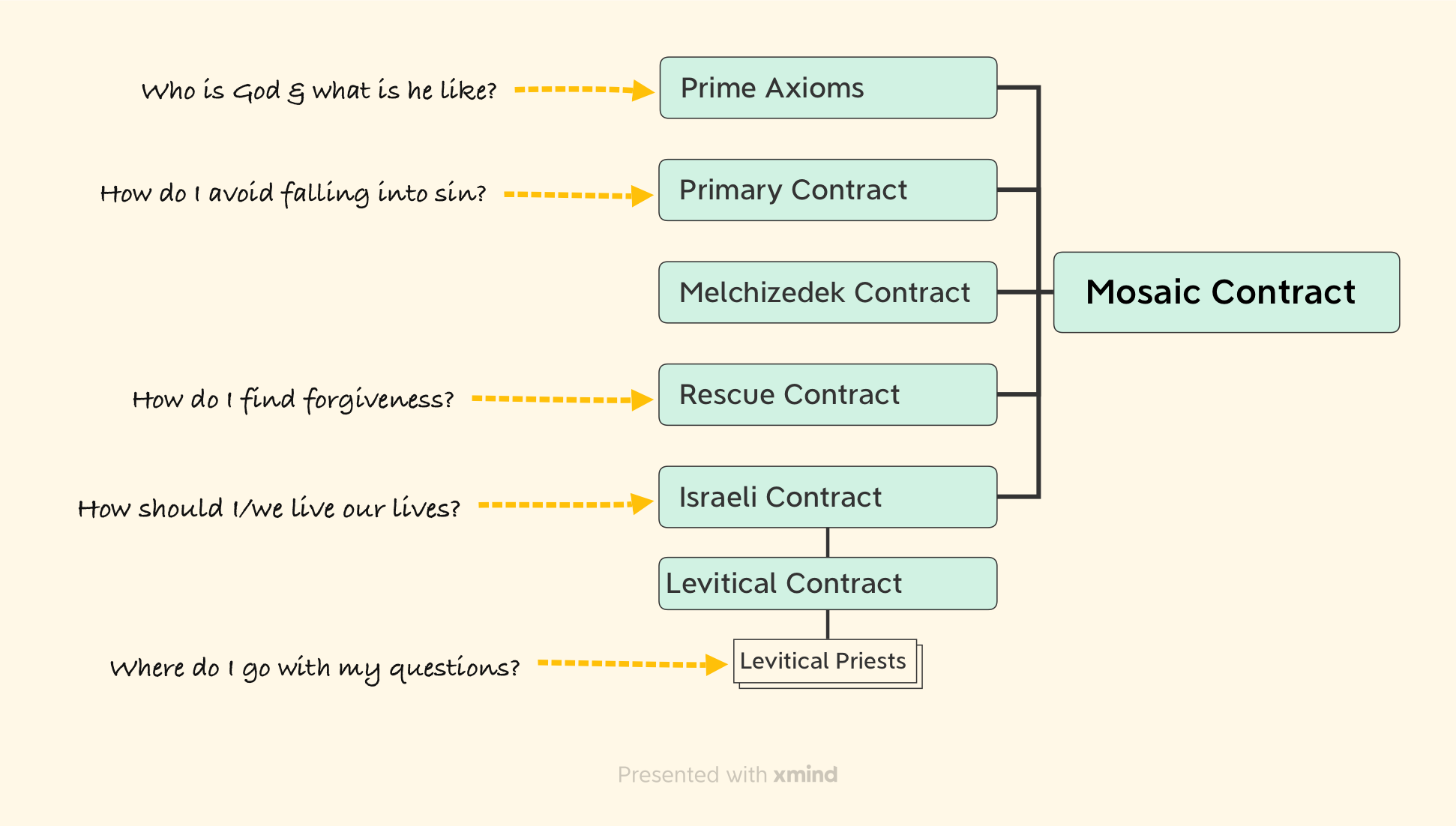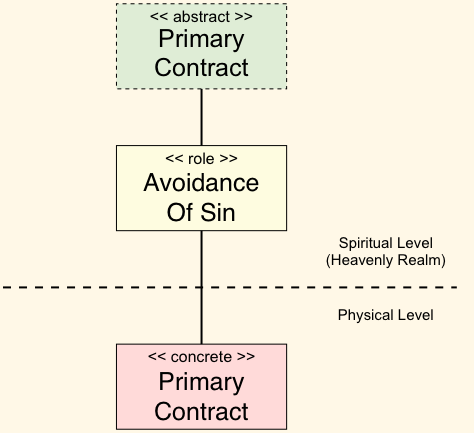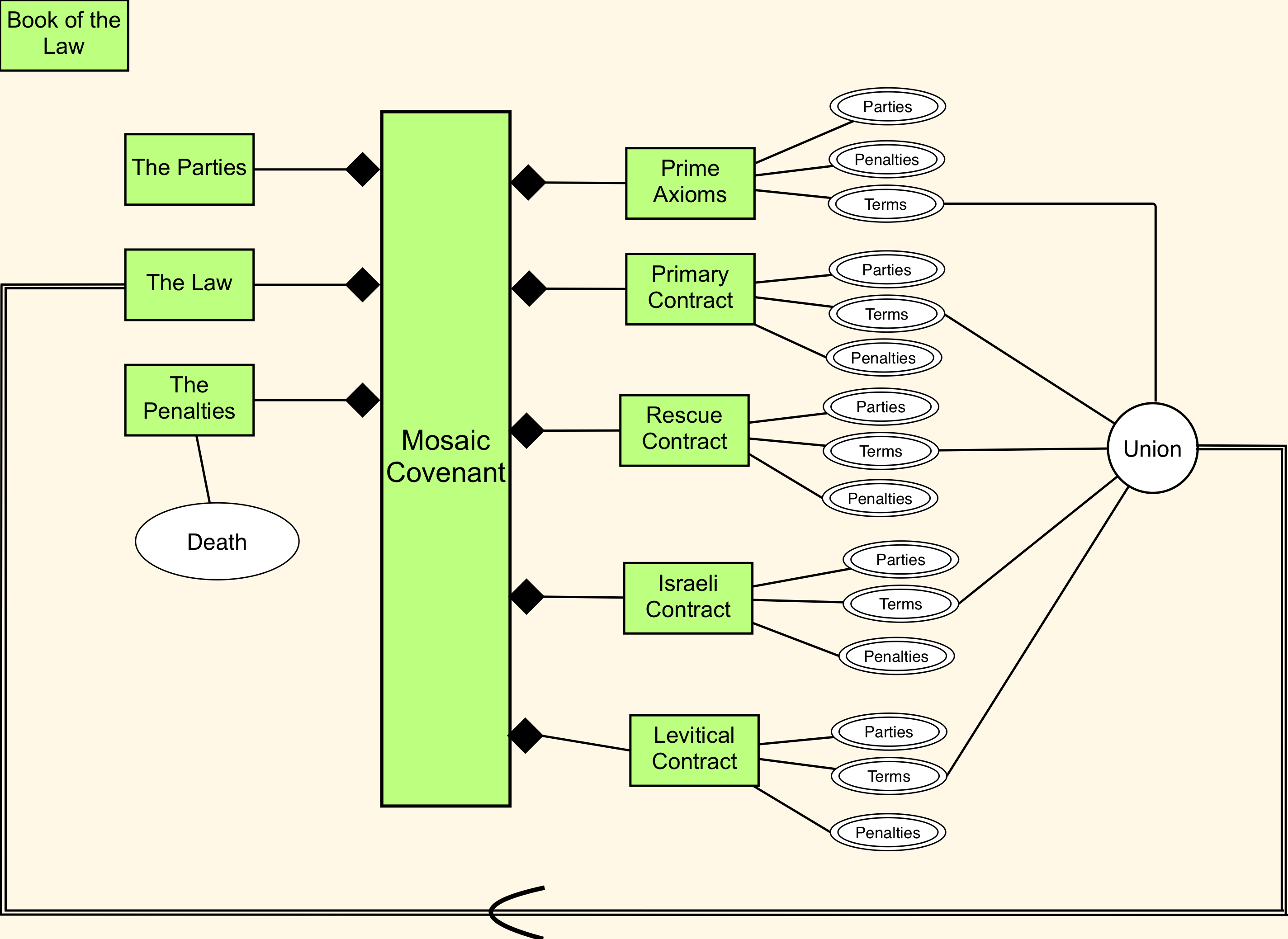
The Prime Axioms are a statement about the Lord God: His character and personality; standards; power; House Rules; intentions...
Nevertheless, the Prime Axioms are an integral part of the Primary Contract - the two are dealt with separately as an aid to education. Certainly, if one can't accept God for who and what He is, then one is excluded from His offer of the Primary Contract.

The Primary Contract can be looked at from many different angles:
Also: Contracts - Secular and Covenant.
[Assignment: Background reading: contracts.]
The Lord God realised that new-arrivals to His Home would have no idea of the standard of conduct required of them. And so the Lord designed the Primary Contract. Its purpose was preventative, enabling the newcomer to dwell safely in His presence without falling into sin and error. The Primary Contract was operative in the Eden Annex - though it is not immediately obvious from the text.
The Covenant makes its explicit, detailed appearance in Scripture with the Mosaic Covenant. The knowledge, thus generated, helps us go back in time to the Garden Annex, and to the Eden Covenant, and to understand what was taking place at that time.

The 613 Mitzvot are an explicit unordered set of commandments. A study of Covenant structure uncovers the research carried out by Father and Son before putting it into operation. So, why was the Covenant presented without offering any sense of the underlying structure? Was it, in part, to provide a measure of the Lord's planned obfuscation?
One might also ask, “Why didn't the Lord short-circuit the explicit set and go straight to the evaluation of the Two Abstract Rules?”
The answer probably lies with the low level of knowledge and understanding at the time, Israel's persistent backsliding, and the need to provide a solid foundation for education. But the Lord's plans never really materialised as He'd hoped. Israel defiled the Covenant, shaping it in accordance with their own wishes. Then along came Paul and the unknown writer to the Hebrews, who further defiled the Covenant, and who dissed the Lord spirit and turned defiant sin into unforgivable sin with its guarantee of Death. The Messianic Jews have tried to keep a foot in both camps, preferring the Bible for their reference rather than the Scriptures.

The 613 commandments have an educational function, leading to an appreciation of the structure of the Covenant. They also promote discussion with the Lord. For example, a person can't be condemned to death on the evidence of one person; which raises the question of collusion among the witnesses, and ways to overcome that. And this then leads to a discussion with the Lord regarding justice and jurisprudence. Collusion was, for example, evident in Jesus' trial:
[59] Now the chief priests and the whole council were looking for false testimony against Jesus so that they might put him to death, [60] but they found none, though many false witnesses came forward. (Matthew 26:59-60a NRSV)
It is possible to group various commandments together, which then can be seen to form components of the internal structure of the Mosaic Covenant:
These 'explanations' can be mapped to the actual structure of the Mosaic Covenant:
A children's schematic:

Fig.1: Children's schematic of the Mosaic Covenant
The Melchizedek Contract and the representation of Jesus in the Covenant are, perhaps, topics for older youngsters, those approaching the Age of Discretion.
Since the Primary Contract is a component of the Covenant [Contract], the topic will be dealt with in the general context of the Covenant (see Covenant - a contract?).
Since the Primary Contract is a component of the Covenant [Contract], the topic will be dealt with in the general context of the Covenant (see Covenant - amendable?).
See: Contract Schena.
Also: Contracts - Secular and Covenant.
A secular contract revolves around a party's needs and another party's ability to meet that need. In other words, it is based on mutual benefit.
The Primary Contract is no different - as is the Covenant and all its other component contracts.
The Lord God puts the Primary Covenant on the Spiritual Level when He makes His intentions known. To paraphrase His message, "Obedience to the Primary Contract will keep you from falling into sin and error, thereby enabling you to dwell safely in My company."
But He is indirectly asking a question which will put the listener's response on the same Spiritual Level: "Is this something you want? Do you desire to dwell with Me throughout Eternity?"
The Primary Contract will allow new-arrivals to dwell safely in His presence. At the same time, the Lord will be surrounded by friends, and will no longer be 'home alone'.
The Two Great Commandments may be rewritten thus (Logical Equivalence):
The curly brackets denote scope. They show that the second great abstract rule operates entirely within the scope of the first rule. With regard to the rules, they are abstract because they do not explain 'how'. They must be mapped to the real-word situation if they are to be instantiated. One might say that evaluation of the Two Abstract Rules could lead to an infinite number of commandments in the real world.
Consider the abstract rule 'do not let anyone in Israel starve'. This must address many different scenarios: the ill; the handicapped; those in urban areas; those in rural areas; those without money or hope†; or ... But, in addition to those things, there are the further options brought by progress: financial; agriculture; science; technology...
† [7 After some time the wadi dried up, because there was no rain in the land. 8 And the word of the LORD came to him: 9 “Go at once to Zarephath of Sidon, and stay there; I have designated a widow there to feed you.” 10 So he went at once to Zarephath. When he came to the entrance of the town, a widow was there gathering wood. He called out to her, “Please bring me a little water in your pitcher, and let me drink.” 11 As she went to fetch it, he called out to her, “Please bring along a piece of bread for me.” 12 “As the LORD your God lives," she replied, “I have nothing baked, nothing but a handful of flour in a jar and a little oil in a jug. I am just gathering a couple of sticks, so that I can go home and prepare it for me and my son; we shall eat it and then we shall die.” 13 “Don't be afraid," said Elijah to her. “Go and do as you have said; but first make me a small cake from what you have there, and bring it out to me; then make some for yourself and your son. 14 For thus said the LORD, the God of Israel: The jar of flour shall not give out and the jug of oil shall not fail until the day that the LORD sends rain upon the ground.” 15 She went and did as Elijah had spoken, and she and he and her household had food for a long time. 16 The jar of flour did not give out, nor did the jug of oil fail, just as the LORD had spoken through Elijah. (1 Kings 17:7-16 (Tanakh))]
In other words the mapping from the Spiritual Level to the Physical Level must be dynamic, able to handle unexpected changes in circumstances.
When it comes to helping one's neighbour, both rules are triggered simultaneously. This will ensure that one's help remains in line with what is acceptable to the Lord. See also Operation of the Two Great Abstract Rules.

Fig.4: The Primary Contract and its role.
An abstract entity existing at the Spiritual Level in the Heavenly Realm, will have a role or roles assigned to it at the Spiritual Level. In the case of the abstract Primary Contract, the role is centered on the avoidance of sin, as seen in the children's schematic of the Covenant:
A children's schematic:

Fig.5: Children's schematic of the Mosaic Covenant
The Lord knows that prevention is better than cure. Nevertheless, He provides the Rescue Contract for those who do fall into sin and error.
[Essay: The Rescue Contract will not be required in the New Jerusalem. How does this help to explain the dynamic structure of the Covenant?]
Two aspects to consider:

Fig.6: Integration of the Primary Contract into the Covenant, with regard to the Law.
[Essay: Instantiation of the Primary Contract.]
[Essay: Integration of the Primary Contract into the Covenant.]
Version: 2025-04-13